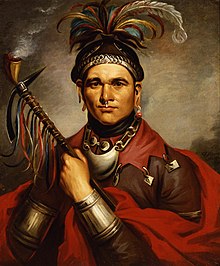Cornplanter
Gaiänt'wakê (* around 1740 in Canawagus the Genesee River , † 1836 in Warren in Pennsylvania ), commonly known as Cornplanter ( corn planter ), was a chief of the Seneca . He was the son of an Indian mother and a Dutch father and was also called John O'Bail (sometimes also written "Abeel") after his fur trader father.
Career
During the American Revolution he wanted to remain neutral, but was accused of cowardice by the Mohawk chief Joseph Brant . Thereupon he and the large part of the Iroquois League were convinced to enter the War of Independence on the British side. He was the deputy commander in chief after Brant at the Battle of Wyoming Valley in 1778, also known as the Wyoming Valley Massacre, as women and children were scalped. He also took part in the Cherry Valley campaign in 1780, later referred to as the Cherry Valley Massacre for the same reason. During this campaign, his men burned his father's house and almost killed him. Cornplanter recognized him, apologized, and offered to either come to the Seneca with him or to return to his white family. His father chose the second alternative. The Iroquois victories prompted the Continental Congress to appoint John Sullivan to lead an expedition into the Iroquois area to end another threat. After a short and decisive defeat of the Iroquois and the British accompanying them at Newtown , Sullivan systematically destroyed Iroquois villages and farms throughout northern New York in the summer and fall of 1779 .
After the great defeat of the Iroquois during the Sullivan expedition and the defeat of the British in the War of Independence, Cornplanter decided to stand up for peace. He became a mediator in disputes between American settlers and the Indians. He was one of the signatories to the Fort Stanwix Treaty in 1784.
He learned the customs of the white man and came to the conviction that the Indians had to settle down, practice agriculture and live peacefully. Hence the name cornplanter.
During the Indian Wars in Ohio and Indiana right after the revolution, Cornplanter managed to convince the Seneca to remain neutral. He tried to negotiate with the Shawnee on behalf of the US government . In grateful recognition of his help, Cornplanter and his descendants were given an area along the Allegheny River in Pennsylvania "forever" .
He died in 1836 in old age on his lands. In 1965, the new Kinzua Dam near Warren flooded his property. His grave in the country was moved to higher ground.
Cornplanter was the half-brother of Handsome Lake and the uncle of Governor Blacksnake .
Web links
- John C. Mohawk: Cornplanter . In: The Encyclopedia of North American Indians (English)
| personal data | |
|---|---|
| SURNAME | Cornplanter |
| ALTERNATIVE NAMES | Gaiänt'wakê; O'Bail, John; Abeel, John |
| BRIEF DESCRIPTION | Chief of the Seneca |
| DATE OF BIRTH | around 1740 |
| PLACE OF BIRTH | at Canawagus on the Genesee River , New York , USA |
| DATE OF DEATH | 1836 |
| Place of death | near Warren , Pennsylvania , USA |
